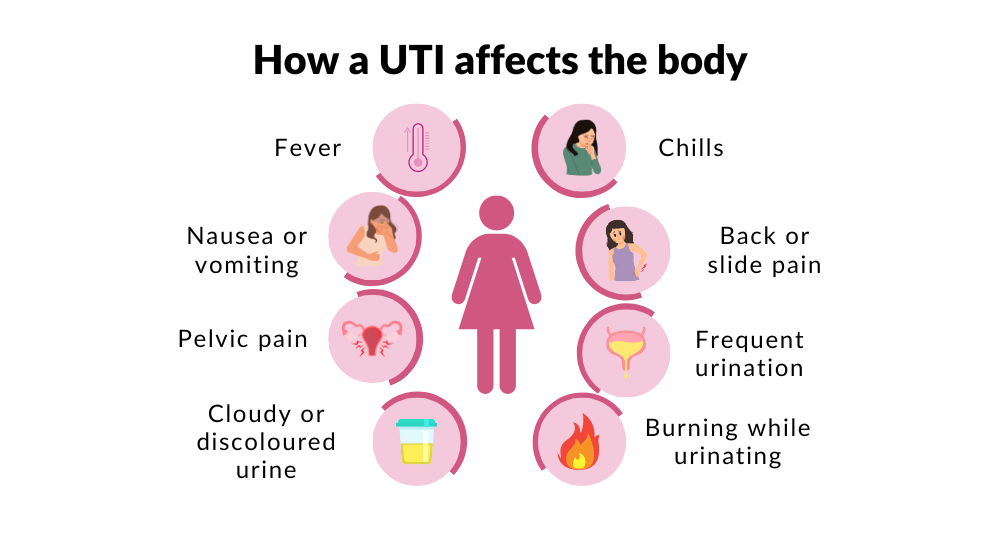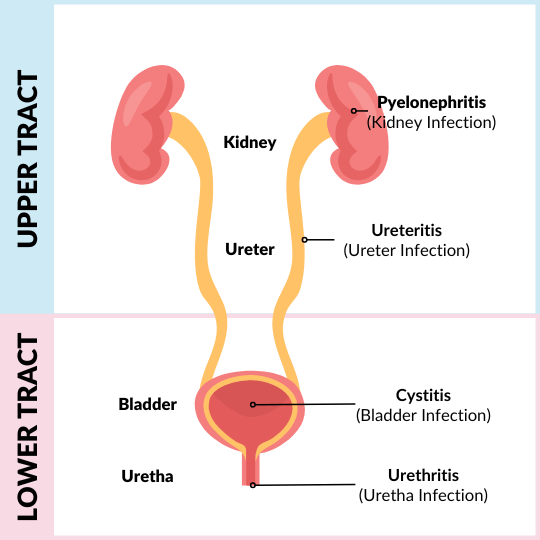What Are the Symptoms of UTI in Females?
Table of Contents
Urinary tract infections (UTIs) are common, especially in women, due to their shorter urethra, which allows bacteria easier access to the bladder. Recognising the symptoms of UTIs can help you seek treatment promptly and prevent complications. UTIs can be classified into two main categories: lower UTIs and upper UTIs.
Symptoms of UTIs
Lower UTIs
Lower UTIs involve infections of the bladder (cystitis) or urethra. These infections can cause several symptoms:
- Frequent need to urinate: You may feel the need to pee more often than usual.
- Pain or discomfort while urinating: This can manifest as a burning sensation or sharp pain.
- Sudden urges to urinate: These can come on very quickly and intensely.
- Feeling of incomplete bladder emptying: You may feel like you can’t completely empty your bladder.
- Lower abdominal pain: Pain or discomfort in the lower part of your tummy.
- Changes in urine: Your urine may be cloudy, foul-smelling, or contain blood.
- General malaise: Feeling generally unwell, achy, and tired.
Lower UTIs are common and usually not a major concern. You can speak to your pharmacist for advice and treatment.

Upper UTIs
Upper UTIs involve infections of the kidneys or ureters (the tubes connecting the kidneys to the bladder). These infections can cause more severe symptoms and include those of lower UTIs plus:
- High temperature (fever): A fever of 38ºC (100.4ºF) or above.
- Side or back pain: Pain in your sides or back, often below the ribs.
- Shivering and chills: Feeling cold and shivery.
- Nausea and vomiting: Feeling and being sick.
- Confusion: This can occur, especially in older adults.
- Agitation or restlessness: Feeling unusually agitated or restless.
Upper UTIs can be serious if left untreated, as they may damage the kidneys or spread to the bloodstream.
When to seek medical advice
You should speak to your GP urgently if you or someone you care for has symptoms of a UTI and:
- A very high temperature or feels hot and shivery.
- A low temperature below 36°C.
- Confusion or drowsiness.
- Pain in the lower tummy or in the back, just under the ribs.
- Blood in the urine.
These symptoms could indicate a kidney infection, leading to severe complications if not treated promptly. If your GP is closed, contact NHS 111 for advice.
Treatment for UTIs
UTIs are usually treated with a short course of antibiotics. Most women are given a 3-day course of antibiotic tablets or capsules. Men, pregnant women, and those with more severe symptoms may require a longer course (we do not offer this). Symptoms typically improve within 3 to 5 days of starting treatment. It is essential to complete the full course of antibiotics, even if you start feeling better, to ensure the infection is fully cleared.
Over-the-counter pain relief, such as paracetamol, can help alleviate discomfort. Staying well-hydrated by drinking plenty of fluids may also help you feel better.
Return to your GP if your symptoms do not improve, worsen, or recur after treatment.
Causes of UTIs
UTIs occur when the urinary tract becomes infected, usually by bacteria. Common causes include:
- Bacteria from the gut enter the urinary tract through the urethra, often due to improper wiping or during sexual intercourse.
- Obstructions in the urinary tract, such as kidney stones.
- Difficulty fully emptying the bladder.
- Use of contraceptive diaphragms or spermicide-coated condoms.
- Diabetes.
- A weakened immune system, for example, from chemotherapy or HIV.
- Use of a urinary catheter.
- An enlarged prostate gland in men.
Women are more likely to get UTIs because their urethra is shorter and closer to the anus.

Preventing UTIs
Here are some prevention tips:
Do:
✅ Pee as soon as you need to: Don’t hold in urine.
✅ Empty your bladder fully: Ensure you fully empty your bladder each time you urinate.
✅ Stay hydrated: Drink plenty of fluids.
✅ Wipe from front to back: After using the toilet, always wipe from front to back.
✅ Pee after sex: Urinate as soon as possible after having sex.
✅ Take showers instead of baths: Opt for showers to reduce the risk of infection.
✅ Wear cotton underwear: Choose cotton over synthetic materials like nylon.
✅ Avoid tight clothing: Avoid tight jeans and trousers.
Don’t:
🚫 Avoid perfumed products: Do not use perfumed bubble bath, soap, or talcum powder around your genitals; use plain, unperfumed ones instead.
🚫 Avoid spermicidal products: Do not use a diaphragm or condoms with spermicidal lubricant; consider other types of contraception.
When to seek further help
If preventive measures are ineffective or you experience recurrent UTIs, speak to your GP. Although cranberry juice and probiotics are often recommended, they are not proven to reduce the chances of getting UTIs.
By recognising the symptoms of UTIs and taking appropriate actions, you can manage and prevent these infections effectively.


